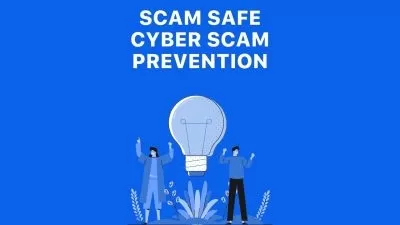Corporate Fraud Regulations & Control
EDUCBA Bridging the Gap
2:02:49
Description
Learn the key aspects about corporate fraud regulations and also understand how ratios can be used in fraud control
What You'll Learn?
- The Fraud Triangle
- Examples of Corporate Fraud
- COSO Framework
- Fraud Prevention Controls
- Fraud Detection Controls
Who is this for?
What You Need to Know?
More details
DescriptionThrough this tutorial we are going to learn the key aspects about corporate fraud regulations and also understand how ratios can be used in fraud control.
The training will include the following;
Introduction
The Fraud Triangle
Examples of Corporate Fraud
Regulations
SOX Act
COSO Framework
Fraud Prevention Controls
Fraud Detection Controls
Fraud can happen in a business of any size, but small businesses are often targets of fraud. According to the American Institute of Certified Public Accountants, small and midsize companies suffer more losses due to fraud than their larger counterparts. Experts estimate that companies lose 5% to 6% of their annual revenue to fraud, so every company should have a comprehensive fraud prevention program. A fraud prevention program is not difficult to implement. It simply consists of education, investigation, and proactive prevention policies. Since employees are the most likely to report issues or any fraudulent activities, you certainly want to give them both the knowledge and the tools to help your company weed out any instances that may be taking place. And while fraud prevention efforts are designed to stop employee fraud, note that any investigations of suspected instances of fraud or employee theft may also act as a deterrent to other employees who may be either committing or contemplating fraud. The bulk of your company's fraud prevention efforts should be focused on the creation and implementation of proactive preventive techniques. This includes establishing internal controls and putting into place policies and procedures that are specifically designed to prevent fraud. One of the best ways to develop prevention policies may include utilizing an experienced anti-fraud professional. Make sure to find one who is experienced and has investigated numerous instances in order to help you to develop the most relevant and most effective anti-fraud controls.
Who this course is for:
- Bankers, Accountants, Stakeholders of a company, Anyone who wants to learn about fraud control
Through this tutorial we are going to learn the key aspects about corporate fraud regulations and also understand how ratios can be used in fraud control.
The training will include the following;
Introduction
The Fraud Triangle
Examples of Corporate Fraud
Regulations
SOX Act
COSO Framework
Fraud Prevention Controls
Fraud Detection Controls
Fraud can happen in a business of any size, but small businesses are often targets of fraud. According to the American Institute of Certified Public Accountants, small and midsize companies suffer more losses due to fraud than their larger counterparts. Experts estimate that companies lose 5% to 6% of their annual revenue to fraud, so every company should have a comprehensive fraud prevention program. A fraud prevention program is not difficult to implement. It simply consists of education, investigation, and proactive prevention policies. Since employees are the most likely to report issues or any fraudulent activities, you certainly want to give them both the knowledge and the tools to help your company weed out any instances that may be taking place. And while fraud prevention efforts are designed to stop employee fraud, note that any investigations of suspected instances of fraud or employee theft may also act as a deterrent to other employees who may be either committing or contemplating fraud. The bulk of your company's fraud prevention efforts should be focused on the creation and implementation of proactive preventive techniques. This includes establishing internal controls and putting into place policies and procedures that are specifically designed to prevent fraud. One of the best ways to develop prevention policies may include utilizing an experienced anti-fraud professional. Make sure to find one who is experienced and has investigated numerous instances in order to help you to develop the most relevant and most effective anti-fraud controls.
Who this course is for:
- Bankers, Accountants, Stakeholders of a company, Anyone who wants to learn about fraud control
User Reviews
Rating
EDUCBA Bridging the Gap
Instructor's Courses
Udemy
View courses Udemy- language english
- Training sessions 16
- duration 2:02:49
- Release Date 2023/12/16










